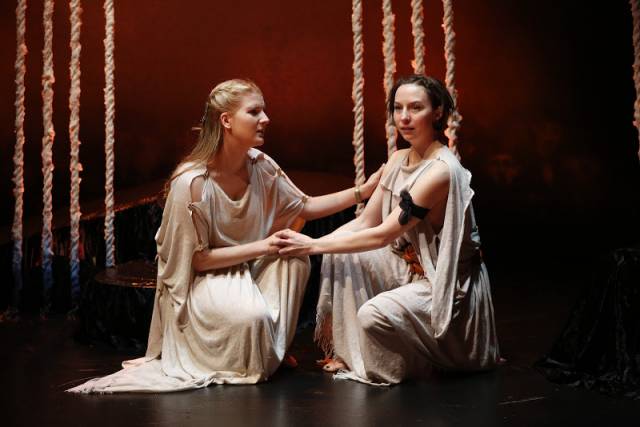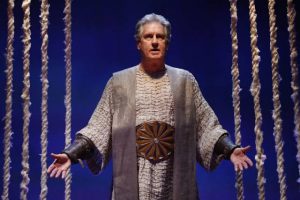

Seamus Heaney’s The Burial at Thebes, a translation of Sophocles’ tragedy Antigone, was written as a response to the invasion of Iraq in 2003. Telling the story of one woman who dares to defy a king and society for what she believes is just, The Burial of Thebes is running at the Irish Repertory Theatre in a new production under the direction of Irish Rep's Artistic Director Charlotte Moore. Here Ms. Moore talks to StageBuddy about this production of The Burial at Thebes.
How did you come to be involved with The Burial at Thebes?
I had thought about doing it very seriously before. I had chatted with Seamus Heaney for a brief period about doing it before and how I had very much enjoyed it, and he said that we were the ideal theatre company for it because the language that he used in it should be better used by an Irish company. But I just couldn’t cast it. I saw a lot of people and thought about a lot of people to do these roles, but nobody seemed right to me. So, I put it away.
And the next time I saw Seamus was in an elevator at some event and he said, “Whatever happened to The Burial at Thebes? I was ready to put on my black tie and come see it.”
And I said, “Oh, uh, I couldn’t cast it.”
And his words were, “See that you do.”
So, this season finally, I thought, I’m going to do that. I’m going to do it. And I did.
So, you knew Seamus Heaney then?
I did know him and miss him very much. He was a straight arrow with a genius for words, that’s how I would define Seamus and I don’t say that very often.
Apart from this, do you have an interest in the Classics in general?
I tell you, the first play I ever did in college was Hippolytus and I was in the Chorus and memorized the whole thing. I can still say it to you and if you’re not careful, I will. That kind of set me off on an interest in the Greeks and the Classics.
Now, this time I went to NYU, to the head of that department, the Ancient Greek Classics Department, Dr. Peter Meineck, and I chatted with him and talked about how to actually get the courage to do this. I sat down with him and said, “Dr. Meineck, tell me the story of this play.” Because I just wasn’t sure about all the gods and the peripheral characters of this play. I said, “Just tell me the story.” So, to sit down with a scholar like that, an expert of the world, it helps a lot.
Sure, sure. So how does this compare with some of the more modern things that you’ve been involved with?
Well, I think I’ve done a whole lot of them; I’ve done most of Sean O’Casey and I’ve done a heck of a lot of Brian Friel. We’ve done Conor McPherson. And Seamus has brought the language, made it accessible to today’s audience, a bit more than Sophocles, who was of course a genius, but I must say it’s great fun, it’s such great fun to hear this play made accessible to today’s audience. The tragedy, it’s a huge tragedy, of course, probably the most famous of them all, but it made us laugh at times, the way Seamus put things so everybody could get it.
Yeah, as with Beowulf, he certainly had a talent for making things like this accessible.
He sure did. He sure did.
So, you have these characters who have been around for two and a half millennia, and the language obviously helps a lot, but how did you help the actors sort of make these characters their own?
Boy, I wish I could take credit for that. They began to be really deeply interested in their characters. I don’t know what did that. It doesn’t always happen when you’re directing a play, that the actors come in with such a deep interest and ownership of the role. But I swear, they arrived with it. We worked it out, we worked hard making the characters live and making the play in an era, a period of time that was much more restricted than this one is. They were operating under so many rules and laws of Ancient Greece that we had to deeply understand… I hope we did a good job, because we sure worked hard at it.
Yes, you did, it came off very well.
Well, thank you. I can’t tell you how nice it is to hear that because we worked very hard at it.
Now, there are some differences in this play from the original one. For instance, Eurydice kind of takes the place of the leader of the chorus…
Yes, I divided the chorus parts up, on the advice of many people, including Dr. Meineck. And I know that Ivo van Hove, in the BAM production of Antigone, which I did not see on purpose, that he did that, too, I found out later. He did that, too, he gave the parts out to different characters.
How much freedom did you feel you had in general? I mean, it’s such a structured play, the structure is so important...
I never changed any of the structure, I never changed a line ever; not a word of any line, nor any punctuation of any line. I wouldn’t do that, not with a Nobel Laureate looking over my shoulder. But, other than that, Seamus said, “Do what you will with it.”

The lighting was very impressive. What was the process of developing that like?
Well, Tony Walton, who designed the set and is an Oscar-winner and Tony-winner multiple times, and Brian Nason, the lighting designer, had worked often together before, so that was a step-up for me. By the time I got in there, in the tech rehearsals, Brian had set up his design and he had hung his lights before I got there, and when I saw it, I must say, I was amazed, because lighting is very important to me, all my life, and I was excited by it. I thought it was beautiful.
Yes, it certainly adds a lot of emotional tones to the play. When Sophocles wrote his Antigone, there were certain political implications, and in Heaney’s version, especially with the language he uses, there are more contemporary political implications…
Yeah, well, Seamus was, to my amazement -- and I didn’t know this before -- he was a deeply political animal and he had a conscience which reached out to his pals and friends. And finally in this play he got fed up and said, “Ultimately, that’s why I’m writing it and I want it known.” It’s really a political statement.
How did you know him in the first place?
Well, the Irish are a community which I’ve been part of for almost thirty years now and those guys, the big guys, you know, O’Casey and Friel and Tom Kilroy and Seamus Heaney, those guys of a certain age and some actors, those guys were all pals, and if you go to enough events, I’m sure you know this, that same crowd is there, and you find yourself at a table with Seamus Heaney or, you know, you find yourself at a table with the Consul General… which is great, it makes you feel really important.
It’s a good community.
Yes, and a very tightly connected one.
Okay, so when Sophocles first wrote this, there would have been more forgiveness towards Creon…
Oh, yes, I think so. He had a job to do, too, he had a responsibility, big time. Holding it together was his job and he felt threatened by somebody not following his orders and splitting up the community and the city-state there. I mean, of course, many people just think he’s an arch-villain, but Creon certainly, he’s got a job to do and he’s gonna do the best he can to do it.
It’s difficult in the modern age to sort of make him sympathetic…
Yes, but I think you can have sympathy for sovereignties that are not popular. You know, everyone has his own. You can’t really get away from that.

And Paul O’Brien does a good job.
He looks it, doesn’t he? Like a great big old king?
Yeah, it’s hard not to feel some sympathy for him in the end. A lot of times with Classical productions there is a tendency to adopt Received Pronunciation or Mid-Atlantic kind of accents. How did you decide to have the actors keep their regional accents?
By absolute chance, there are four Brits in this production and I asked them to lower their British, because we are Irish after all, not British, to lower their British pronunciation but keep the clarity going. We worked very hard, are still working, on sounding all alike; except for Colin [Lane], which I wanted. I told Seamus that I was going to have a lower-class Irishman be the Guard. By chance I told him that and I’m glad I told him while he was alive; he laughed, and I stuck to it, I stuck to it. I brought in Colin, who’s a real Dub, from Dublin, with kind of a strange Irish accent and he makes us all laugh. It makes him seem different.
So, what’s next for you after The Burial at Thebes?
Well, you know, this is the last production of the Irish Rep in the DR2 stage. Our home on 22nd St. -- although if you looked at it today, you’d think ‘My God! What a mess!’ -- is nearing completion, and our next production will be there in the new building.
Performances of The Burial at Thebes continue through March 6.